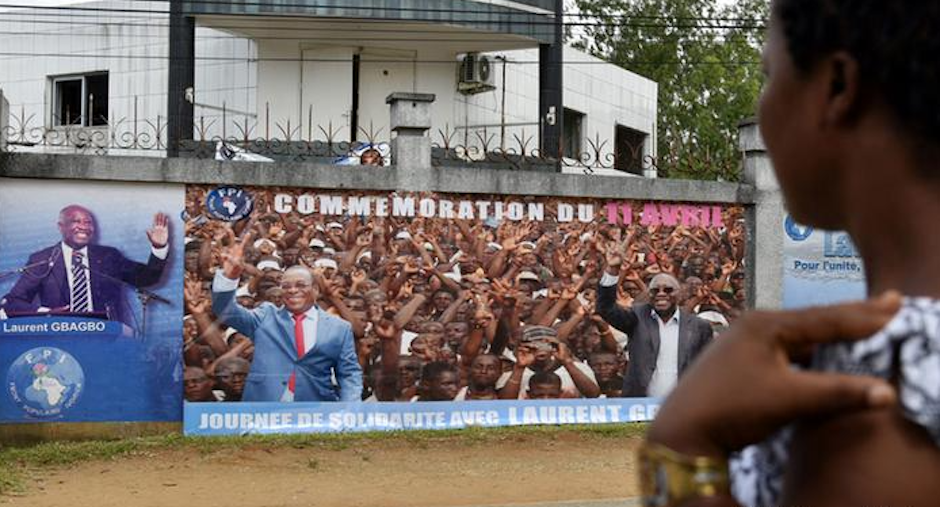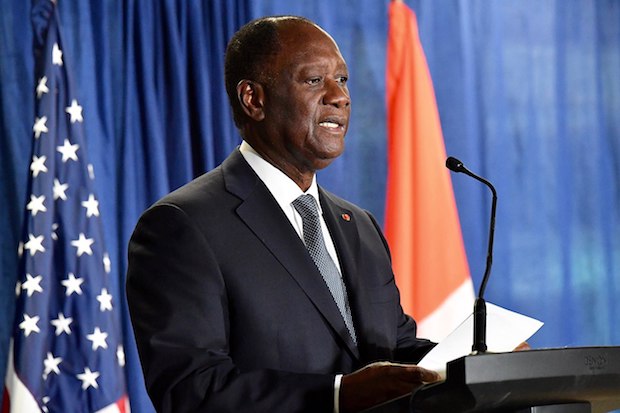The candidacy of the Côte d'Ivoire's current president has polarised society “Pray that the upcoming elections do not plunge our country further into violence”.
 A young woman looks at a poster of reinstated candidate Laurent Gbagbo. / Twitter, Getty, S. Kambou.
A young woman looks at a poster of reinstated candidate Laurent Gbagbo. / Twitter, Getty, S. Kambou.
When Côte d'Ivoire's Prime Minister and government party candidate for the presidential elections on 25 October, Amadou Gon Coulibaly, died suddenly in June, many Ivorians did not expect that the current President, Alassane Ouattara, would run for re-election. Mainly, because the Constitution forbids it.
Ouattara has been President since 2010, and the two 5-year terms the Ivorian constitution allows him to be in that role finish this year, when he is close to turning 80.
However, Ouattara has justified his new candidacy for the Rassemblement des Houphouetistiers pour la Démocratie et la Paix (RHDP), on the unexpected death of Coulibaly, arguing that the constitutional reform carried out in 2016 allows him to aim for re-election.
“I have decided to respond favorably to the call of my fellow citizens who asked me to be a presidential candidate. This decision, carefully considered, is a duty that I accept in the best interest of the nation, to continue putting my experience at the service of our country”, Ouattara said.
A part of the Ivorian society has taken part in the massive protests since August, in which several protesters have died.
Saï Mathieu Guei, Secretary General of IFES (International Fellowship of Evangelical Students) in Côte d'Ivoire, told Sapnish news website Protestante Digital that “after the announcement of President Ouattara's candidacy, there has been real tension in the country”.
“People are disappointed and feel betrayed because the President had said on 5 March at the Parliament, that he would no longer stand for elections. But against all expectations he has changed his mind, in violation of the Constitution”, Guei added.
The tension usually comes in Côte d'Ivoire after the elections, as in the 2010, when the Electoral Commission declared Ouattara winner and the Constitutional Council annulled the results that made Laurent Gbagbo won, which caused a wave of violence that in just a few months cost the lives of some 3,000 people.
However, this time the Ivorians have been protesting for weeks in the streets of the country's main cities before the election. Outrage has grown as the pre-campaign progressed, especially with the arrest of the political activist and leader of the Ivorian Citizen Alternative (ACI) group, Pulchérie Gbalet.
“Ouattara uses national television as a propaganda, because he knows that his opponents are using social media very much”, Guei pointed out.
The polarisation has grown even more after the African Court ordered the Constitutional Council of Côte d'Ivoire to accept the candidacy of Gbagbo, a former President of the country who has a 20-year prison sentence for the looting of the national branch of the Central Bank of West African States (BCEAO).
“The population no longer wants to see President Ouattara at the head of the country, but everyone is convinced that he will prevail by force and fraud. The President has appointed his relatives to most institutions and the judiciary, and he has always used them to make decisions in his favor”, explains the leader of the evangelical student movement in the country.
Furthermore, “people are not willing to accept the force that the president and his followers want to impose. That is why protest marches have been organized and the government has prohibited them”.

According to Guei, the evangelicals are also “very divided”. “There are at least four evangelical federations whose leaders do not understand each other and cannot speak as one voice”.
In February, the Consistory of the Evangelical Protestants of Côte d'Ivoire asked “all to commit to creating an environment conducive to peaceful, fair and transparent elections, which should lead to indisputable results for all”.
“We invite the members of our assemblies, our fellow citizens and all leaders to seek the best virtues for the construction of our beloved nation”, they stressed.
Local media Abidjan.net reported that several evangelical organizations, such as the Consistory of the Evangelical Protestants of Ivory Coast, the Conference of Pentecostal and Evangelical Bishops of Ivory Coast and the Compendium of the New Generation of Pastors in Ivory Coast, met in September to work for unity. The meeting was well appreciated by the Prime Minister's office.
“In general, evangelicals rarely speak out on political issues and when they do, it is always separately. Most of the time, the church federations are more involved in praying for elections”, the IFES Secretary explained.
Meanwhile, “other organizations, such as we at IFES, have decided to train Christians and sensitise leaders to help reduce tension and ensure that the elections take place peacefully”.
For Saï Mathieu, the population demands three main things from the new presidency.
The first is to replace the current authorities for people “of integrity and credibility, because although the laws are good, in general, the rulers violate or manipulate them”.
On the other hand, “they want the eradication of corruption. The level of corruption is very high. The president and his relatives create parallel companies to bid for the construction of roads and other infrastructures that, in the end, are of poor quality and expensive work”, he underlines.
Drug trafficking and consumption has also become a serious problem in Côte d'Ivoire, especially “drug use, which has become very strong”.
According to data from the country's Inter-ministerial Committee to Fight Drug Abuse and Illicit Trafficking (CILAD), based on the latest publications on Côte d'Ivoire by the United Nations Office on Drugs and Crime (UNODC), 12% of Ivorians between the ages of 15 and 64 use drugs.
The most popular is cannabis, with an annual prevalence of more than 3% and more than 5,100 kilos consumed in the last year for which data were collected, 2018.
In the midst of such a complex social situation, Guei asks Christians worlwide to pray “that the upcoming elections do not plunge our country further into violence”.
“Pray that the evangelicals of Ivory Coast unite in one voice, that they will not be accomplices of injustice and that they will refrain from false prophecies that discredit the church”, he adds.
The appearance of certain religious movements under the label of 'Christian' is tarnishing the ministerial work carried out so far in the country, where 31% of the population, according to Christian organisation Joshua Project, identifies as Christian.

Las opiniones vertidas por nuestros colaboradores se realizan a nivel personal, pudiendo coincidir o no con la postura de la dirección de Protestante Digital.
Si quieres comentar o